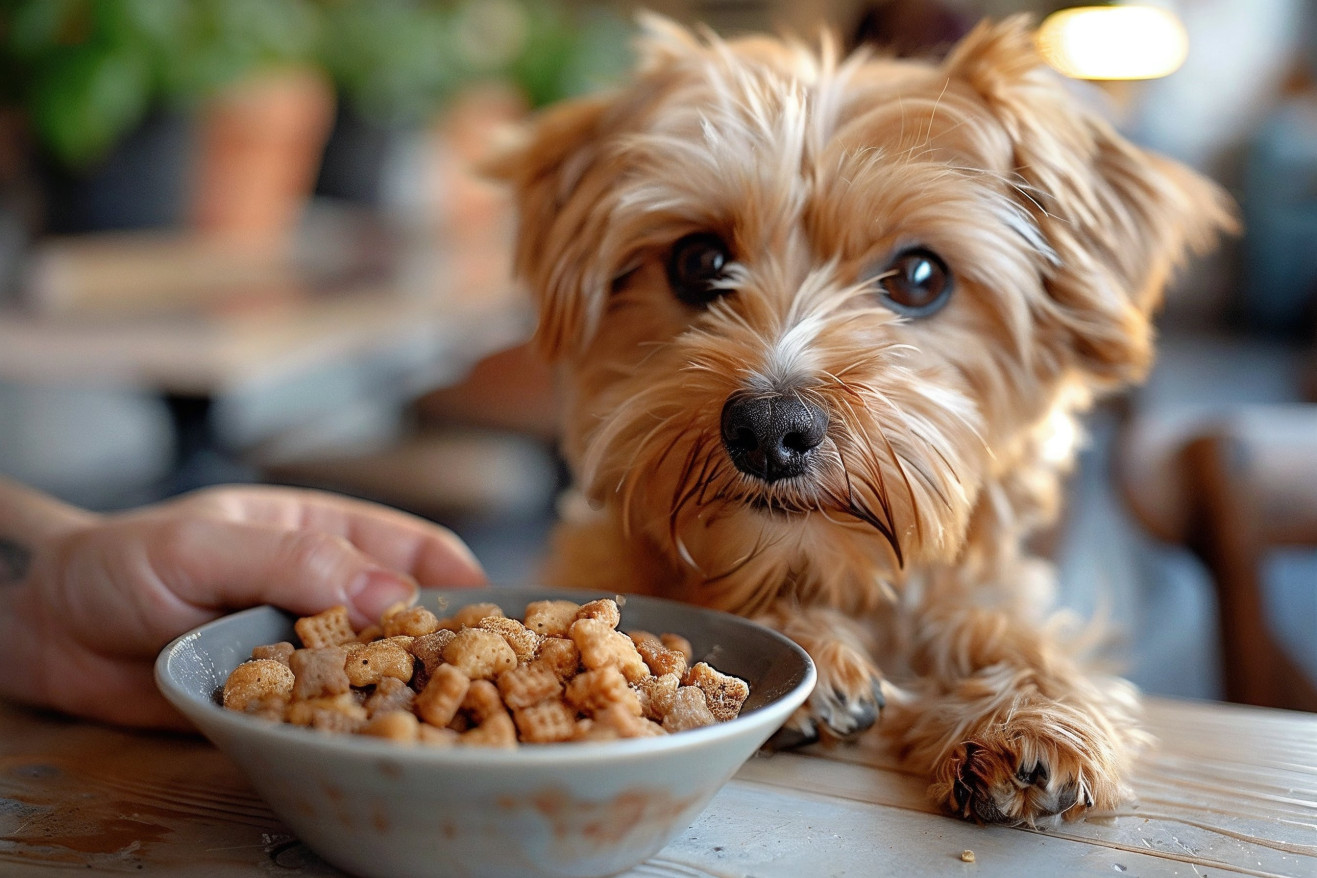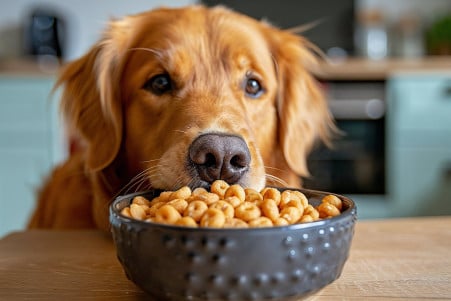Can Dogs Eat Cinnamon Toast Crunch? Unhealthy Ingredients
25 February 2024 • Updated 24 February 2024

While Cinnamon Toast Crunch may be a delicious treat for humans, there are several reasons why it’s not safe for dogs. From the sugar and preservatives to the potential nutmeg toxicity, Cinnamon Toast Crunch is not only nutritionally void for dogs, but it could also lead to health problems. Dogs need to eat food that’s been designed to meet their specific dietary requirements.
This article will take a closer look at the individual ingredients in Cinnamon Toast Crunch and review veterinary nutrition studies to determine how they impact dogs.
It will also cover general nutrition research that compares the dietary needs of dogs and humans, which will help explain why some human foods can be dangerous for our pets. By the end of this article, you’ll be better equipped to make decisions about what to feed your dog.
Can dogs eat Cinnamon Toast Crunch?
Inside the Bowl: What Cinnamon Toast Crunch Does to Dog Health
While it may seem like a harmless snack, a closer look at the nutritional profile of Cinnamon Toast Crunch explains why it’s not good for our furry friends. According to The Goody Pet, the cereal is packed with sugar and additives like GMO canola oil and BHT, which are not good sources of nutrition for dogs. In fact, dogs that eat GMO corn and soy can suffer from severe gut inflammation.
Dogs’ nutritional needs are very different from humans’, and Cinnamon Toast Crunch doesn’t have the important nutrients that dogs need, like high-quality protein. Instead, it has things like nutmeg, which is toxic to dogs, and even cinnamon, which is not toxic, can cause problems like low blood sugar and liver disease when consumed in large amounts.
The Goody Pet points out that this is an example of empty calories. When dogs eat things like Cinnamon Toast Crunch that are packed with empty calories, it can lead to obesity and other health issues. Pet Plate recommends sticking to low-sugar, high-fiber options that are made for dogs to ensure that you’re feeding them in a way that supports their health.
How Dog and Human Diets Differ
Dogs need a balanced diet that includes proteins, fats, and carbohydrates, as well as essential vitamins and minerals to stay healthy. According to VCA Animal Hospitals, the proteins and fats in a dog’s diet need to be easily digestible and come from a high-quality source, while the carbohydrates in the diet, which come from grains and vegetables, are used for energy and to support the health of the intestines.
This is very different from the makeup of a cereal like Cinnamon Toast Crunch, which is high in sugar and doesn’t have the nutritional balance that dogs need.
Not only are the nutritional values of human foods like Cinnamon Toast Crunch not in line with what dogs need, but they also often contain non-essential and even harmful ingredients. PetMD explains that dogs can only make 13 of the 23 amino acids they need, so they need to get the other 10 from their diet.
Cereals like Cinnamon Toast Crunch don’t contain these essential amino acids, which means they can lead to an unbalanced diet that could cause health problems down the road.
That’s why it’s so important to feed dogs specially formulated dog food that meets the guidelines set by the Association of American Feed Control Officials (AAFCO) to ensure that it’s “complete and balanced.”
As WebMD explains, this kind of personalized nutrition for dogs takes into account their specific nutritional needs and ensures that they’re met. From there, it’s easy to see that adding sugary cereals and other human foods to a dog’s diet can throw off the careful balance that their diet is based on.
The Dark Side of Sweetness: Sugar and Additives in Your Dog’s Bowl
Dogs are at risk of many of the same health problems as humans when it comes to consuming too much sugar, including obesity and diabetes. In fact, Volhard Dog Nutrition reports that a whopping 25–30% of dogs are obese, a number that jumps to 40–45% in older dogs.
With type II diabetes affecting about 1 in every 500 dogs, the negative effects of a high-sugar diet are clear. The high levels of additives and simple sugars in processed human foods can lead to spikes in blood sugar, obesity, and even cancer in dogs.
Of particular concern are the additives found in Cinnamon Toast Crunch, which can lead to dysbiosis—bacteria imbalance in the gut—and the immune system problems that can result from it. In addition, xylitol, an artificial sweetener that is poisonous to dogs, can lead to serious health problems, including hypoglycemia and liver failure.
To protect your dog from these risks, it’s important to read dog food labels carefully and look for foods that include complex carbohydrates and natural ingredients. Holiday Barn Pet Resorts explains that it’s important to avoid foods with high glycemic indices, which can throw off a dog’s diet. However, by doing your research and working with nutrition professionals, you can make sure your dog has a diet that’s healthy and free from dangerous additives.
Research on the Impact of Processed Foods on Dog Health
The rise of health issues in dogs due to processed pet foods is similar to the problems that have arisen in human diets. A study in the Royal Society Open Science found that dogs fed a dry, processed pet food diet had higher levels of inflammatory markers, which have been linked to diseases like cancer and heart disease.
This further solidifies the relationship between processed pet foods and the increase in chronic health issues in dogs, which is similar to the relationship between ultra-processed foods and humans, as reported by the Washington Post.
On the other hand, a study in PLoS One found that the impact of less processed diets on dogs was also notable, as dogs fed high-temperature sterilization diets had higher serum triglyceride levels, showing the impact of dietary processing. This study also found that different processing methods led to changes in fecal microbiota, showing the importance of gut health in a dog’s overall health.
Dog owners can help combat these issues by adding more whole or minimally processed toppers to their dog’s diet, as recommended by the Food and Agriculture Organization of the United Nations. By reducing the amount of ultra-processed pet foods that dogs eat and increasing the amount of natural foods in their diet, it’s possible that dog health and longevity could be improved.
How Cinnamon Fits Into Your Dog’s Diet
The safety of cinnamon for dogs depends on the kind and the amount that’s consumed. The American Kennel Club (AKC) explains that while cinnamon isn’t poisonous to dogs, eating too much can cause skin and stomach irritation, coughing, and more serious symptoms like vomiting and diarrhea.
Meanwhile, Forbes Advisor notes that Cassia cinnamon, which is the type of cinnamon found in common household spices like Cinnamon Toast Crunch, contains coumarin, a substance that can cause liver damage and affect heart rate in dogs when consumed in high doses.
On the other hand, Ceylon cinnamon, also known as “true cinnamon,” is considered safer for dogs because it has lower levels of coumarin, according to Pawlicy Advisor. However, this is an important distinction because Cinnamon Toast Crunch generally contains the Cassia type of cinnamon, which could be more dangerous if dogs eat it in large quantities.
For dog owners who are thinking about incorporating cinnamon into their dogs’ diets, the key is to do so in moderation. A small amount of cinnamon—ideally Ceylon cinnamon—can help reduce inflammation and support heart health.
That said, it’s best to talk to your vet before giving your dog cinnamon, especially if your dog has any underlying health issues. When it comes to assessing our dogs’ diets, it’s important to weigh the potential benefits against the potential drawbacks to make sure we’re keeping them safe and healthy.
Final Thoughts: Why Dogs Can’t Eat Cinnamon Toast Crunch
In this article, we’ve made it clear that Cinnamon Toast Crunch, while a delicious breakfast option for humans, is not safe for dogs due to its high sugar content, additives, and the presence of ingredients like nutmeg that are toxic to dogs. We’ve also broken down the nutritional content of this cereal and shown the difference between what dogs need in their diet and what human food can provide.
The importance of a well-balanced diet that is specifically made for dogs cannot be overstated. A diet that is made for dogs will ensure that they get the nutrients they need to be healthy. Human foods, especially sugary cereals, are full of ‘empty calories’ that can lead to obesity, diabetes, and other health problems in dogs.
It’s important for dog owners to be aware of what they are feeding their pets. The bottom line is that feeding dogs human foods like Cinnamon Toast Crunch can throw off their diet and lead to health problems. Let’s make sure that we are taking care of our dogs by feeding them high-quality food that is made to meet their dietary needs.


